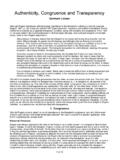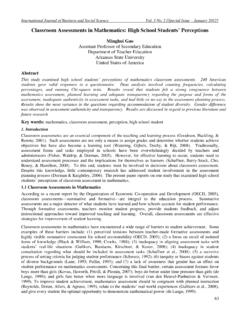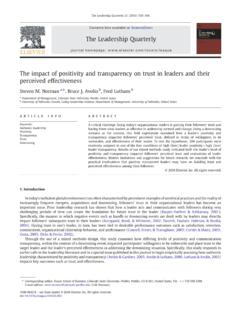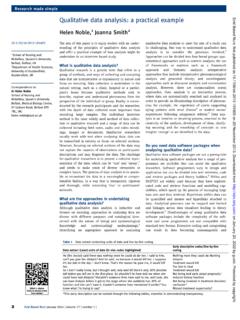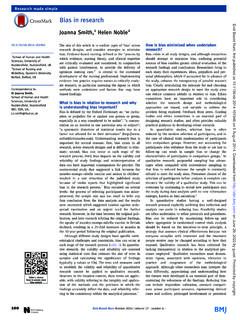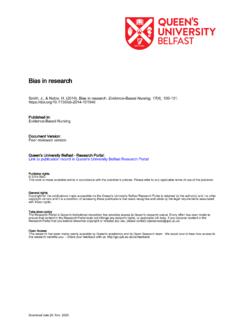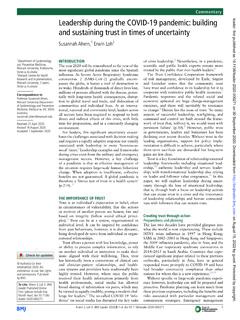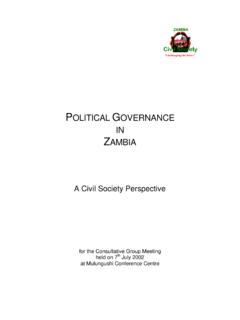Transcription of Islamic Banking and Risk Management: Issues and …
1 64 Journal of Islamic Banking and Finance Dec. 2015 Islamic Banking and Risk management : Issues and Challenges By Nurhafiza Abdul Kader Malim PhD* Abstract In view of the massive failure of Banking institutions in response to the global financial crisis (2007-2009), there has been proliferation of writings on risk management as never before. Islamic Banking is much less affected by the turmoil for a variety of reasons, especially because it is still a very tiny part of the global system and has yet to develop enough connectivity to catch the cold. The current wave of financial liberalization and globalization naturally prompts for examining the question of risk management in Islamic Banking .
2 This paper discusses on risk management in Islamic Banking and focuses on the credit, operational and Shari ah risks . The fact that Islamic Banking is submerged in the global system makes the risk treatment not only urgent but also extra complicated. Their exposure to the risk of financial losses is enhanced and performance may be disrupted. Finally, the paper highlights the Issues and challenges in risk management and provides suggestions for risk mitigation in Islamic Banking . Keywords: Risk; Islamic banks; Risk management , Basel III Introduction Financial development is an important component of the overall development strategy.
3 Growth in the finance industry reduces costs of financial intermediation and raises the overall return on investment. Islamic finance has entered a new stage of development, emerging after global financial crisis as a more equitable, efficient even sustainable form of financing. The stage has started due to the collapse of the conventional financial system that is based on interest. Islamic finance is more efficient and growth promoting, makes the economic system more stable, controls excessive credit creation and speculation and widens risk sharing and provides more sustainability to the financial industry (Al-Jarhi, 2005).
4 In the recent decade, Islamic Banking has experienced remarkable growth and transformation, demonstrating its potential as a competitive form of financial intermediation not only in Muslim countries but also outside the Muslim * The author is working at School of management , Universiti Sains Malaysia, Penang, e-mails: The author is grateful to Professor Emeritus Dr. Zubair Hasan for providing valuable comments and suggestions. Journal of Islamic Banking and Finance Dec.
5 2015 65 world. Currently, Islamic Banking industry is offering a comprehensive range of products and services, serving a broad spectrum of consumers and businesses. It has been one of the fastest growing sectors of international financial markets and is expected to continue expanding at an even faster rate. Islamic Banking has made commendable progress globally in recent decades spanning across 75 countries. It has witnessed significant growth achieving a compound annual growth rate (CAGR) of between 2008 and 2013 with Islamic Banking assets reaching trillion by end of 2013 (KFHR, 2014).
6 Islam encourages trade activities that generate fair and legitimate profit. Fundamental feature of Islamic Banking is the sharing of profit (loss) that entails risk-taking in the transactions which requires a high level of financial disclosure and transparency , especially in the case of Mudarabah or Musharakah contracts. In insulating the Islamic banks from potential risks resulting from excessive leverage and speculative financial activities in the case of conventional banks, Shari ah insists on the linkage of financial transactions with real economic activities.
7 Still, effective risk management capabilities are important for Islamic Banking in the face of challenging global financial environment of heightened uncertainties and increased financial vulnerabilities. These developments require gaining a higher standard of risk awareness and management . Regulatory concern has shifted towards a more risk sensitive capital adequacy framework and the assessment of risk management systems and processes in the financial institutions (Aziz, 2006). This paper examines the Issues and challenges that confront Islamic Banking in the area of risk management .
8 The structure of the paper proceeds as follows. Section 2 presents an overview of risk management , Section 3 elaborates the risk exposures in Islamic Banking industry with reference to credit risk, operational risk and Shari ah risk, Section 4 deals with the Issues and the challenges faced by Islamic Banking in the area, Section 5 discusses the risk mitigation strategies and the final Section 6 contains some concluding remarks. Risk management : An Overview The Concise Oxford Dictionary defines risk to imply something bad, the chance of bad consequences, loss, etc.
9 The definition of risk differs from one discipline to another. The definitions of risk that are typically found in the literature are as follows: (i) the chance of loss; (ii) the possibility of loss; (iii) the dispersion of actual from expected results; (iv) the probability of any outcome being different from the one expected; and (v) the significance of hazard in terms of the likelihood and severity of any possible adversity. Risk implies the randomness facing a decision maker that can be expressed in terms of specific numerical probabilities, whereas uncertainty means that no probabilities can be assigned to possible occurrences or that there is a lack of knowledge about what will or will not happen in the future.
10 In general, risk can be measured in different ways as follows; measures of dispersion, value at risk and the probability, frequency and severity of loss (Moosa, 2007). The definition of risk management takes various forms. Vaughan (1997) defines risk management as a scientific approach to dealing with pure risks by anticipating possible accidental losses and designing and implementing procedures that minimize the occurrence of loss or the financial impact of the losses that do occur. According to Tariqullah and Habib (2001), risk management is a comprehensive system that includes creating an appropriate risk management environment, maintaining an efficient risk measurement, mitigating and monitoring process and establishing an adequate internal Islamic Banking and Risk management : Issues and Challenges 66 Journal of Islamic Banking and Finance Dec.
